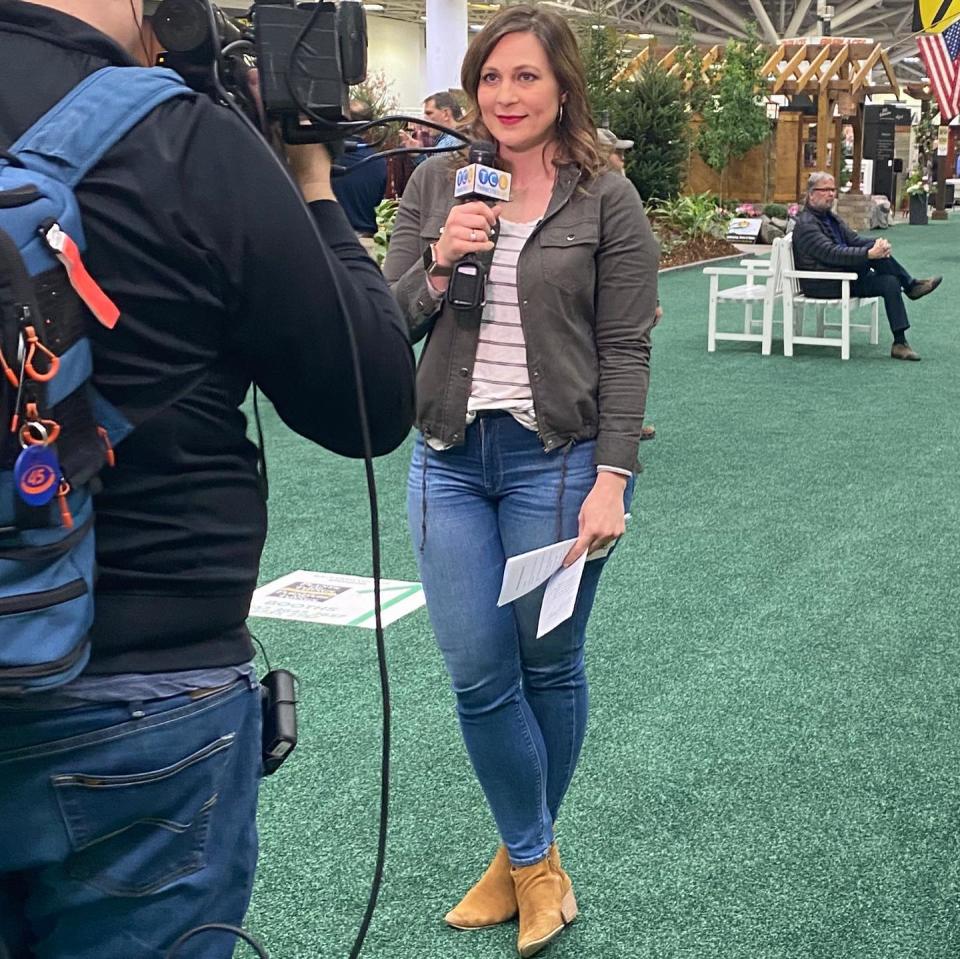TV host calls out viewer for 'venomous' body-shaming remark: ‘It’s not OK’
Advised by a viewer to “cover your butt” or “start working out,” a television host is speaking out to declare that “body shaming will not be tolerated” on her watch.
On Friday, Elizabeth Ries, the host of KSTP-TV’s Twin Cities Live! in Minneapolis, shared two wildly different pieces of viewer mail on Facebook. “I received two emails yesterday. About the same show. The same jeans. The same butt,” the 38-year-old wrote. The first note, from a woman named Julie, complimented Ries’s outfit. “Where did you get the jeans you had on today?” it read. “They looked so great on you. I have a similar build as you and have been looking for skinny’s.”
The second, from a woman named Maggie, was pointedly insulting: “Saw you on TCL at the home and garden show and I was so embarrassed for you,” the woman wrote. “Either start working out or wear much longer shirts that cover your butt. You are definitely not a good example for fitness.”

Ries broke it down: “Julie is saying, ‘Hey! I see myself in you! You are rocking that bod just like I want to rock mine! Will you share the love?’” While the subtext of Maggie’s note was, “I hate my body and I hate myself. And the only way to temporarily numb the pain of my own self-hatred is to lash out at you.”
She continued, “I’m confident enough in myself (I am more than my body!) and my body (strong, healthy, beautiful and birthed two children!) to not let her venomous words change how I look at myself. Regardless, the bite stings. And I speak out about it because IT IS NOT OKAY TO BODY SHAME PEOPLE. While I know that I will not spiral into depression, self harm or an eating disorder, countless studies show that fat shaming (especially of young girls) is DIRECTLY related to disordered eating. There is not a single study that shows that fat shaming leads to better health or fitness.”
And poor etiquette is the least of it, wrote Ries. “These comments can very literally lead to the serious illness or death of those they are directed at. And if she has no problem saying it to me, who else is she saying it to? We must name it, call it out when we see it and shout from the rooftops that body shaming will not be tolerated. Who’s with me?”
Of the 1,300 Facebook fans, one wrote, “Such a gracious response. Why people feel the need to share unwanted opinions and advice, is beyond me,” while others offered, “Makes me so sad that women do this to each other,” and “Tearing down another woman’s self esteem is weak and shows more about their own self worth than yours!”
The juxtaposition of the two emails was “shocking” enough, but watching her 5-year-old daughter confidently twirl in the mirror before school reconfirmed Ries’s reaction. “She looked at herself with such pride and joy, and I thought, ‘I will not sit by and allow someone like this to send these messages to women,” Ries tells Yahoo Lifestyle.
“I haven’t suffered from disordered eating, but like most women, I have dealt with body image issues,” she says. In 2017, the hashtag #TheySaid was shared by those who recalled body-shaming remarks from childhood and beyond. “One woman wrote to me saying she still remembered when her grandmother called her fat at age 11,” says Ries.
No amount of criticism motivates healthy habits, concluded a study published in the Journal of Adolescent Health. “Labeling young girls as ‘too fat’ will never spur positive health behaviors; it is simply going to result in poor body image, unhealthy weight control practices, and disordered eating,” study author Jeffrey Hunger, PhD, told Reuters.
“We need to make body-shaming comments unacceptable,” Ries tells Yahoo Lifestyle. “I can give Maggie grace, but the consequence of her message can be life or death for someone else.”
Read more from Yahoo Lifestyle:
Want daily pop culture news delivered to your inbox? Sign up here for Yahoo Entertainment & Lifestyle's newsletter.
